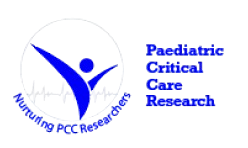Becoming a PCC Researcher

Who can be a researcher?
All people can be researchers. In paediatric critical care, people from clinical and non-clinical backgrounds work and do research, so roles may well straddle different disciplines boundaries or span non-traditional areas. You may already have had additional research training or not, have a PhD or just starting your higher education journey. Whilst education and training are important, curiosity, integrity and tenacity in looking for solutions to real world problems are the essential elements of being a researcher. For inspiration, look at our Researcher Stories.
First steps as a researcher
You can ask colleagues or your local R&D (research & development office) to assist with mapping out who does what type of research, so to match your potential interests and background.
You could approach those researchers to ask whether you could help support existing research projects or studies. Having a practical experience of supporting research programme would be invaluable to start appreciating what conducting research is really like. Helpfully and additionally, the NIHR has recently launched an internship programme to assist health & social care workers with little or no research experience explore clinical research, https://www.nihr.ac.uk/explore-nihr/academy-programmes/hee-nihr-integrated-clinical-and-practitioner-academic-programme.htm#one. To help with navigating the research world, it is also a good idea to start familiarizing yourself with terms commonly encountered within the research community.
Research Glossary demystified:
Funding= money that underpins the research effort. All research, including clinical research, can be expensive and its costs need to be additionally covered by additional funding. Costs, which can include salaries, materials, travel, equipment, training and computing costs etc, are released by dedicated organisations (=Funders, such as NIHR, UKRI, CRUK and the Wellcome Trust to name a few) after proposal have been competitively assessed and approved. This is because proposed research projects or studies usually exceed money available for carrying them out.
Grants= Financial support bestowed to conduct a research study or project. Funding can include support for employing staff, equipment, consumables etc and is usually strictly timebound. Typically funding is awarded to a Principal/ Senior Investigator who manages the research project, the staff employed and the resources awarded.
IRAS= Integrated Research Application System. An online system dedicated to submit and manage approval to conduct research with human participants. Permission for such research studies is absolutely necessary for the safe & ethical conduct of research
Fellowships= Financial support to an individual typically bestowed to support the recipient career advancement and personal development. In addition to funding the fellowship recipient time, training and travel to conferences, fellowships usually include funding to explore a research question or a long term research programme, depending on the type of fellowship applied for. There are undergraduate, Doctoral post-doctoral, intermediate and professorial fellowships available, with eligibility criteria and competitive awarding varying from funder to funder
CRN= CRN= Clinical Research Network, supported by the NIHR. The NIHR Clinical Research Network (CRN) aims to support ” patients, the public and health and care organisations across England to participate in high-quality research, thereby advancing knowledge and improving care”. During 2024 the CRN will transition to a new structure and be renamed the NIHR Research Delivery Network (RDN), https://www.nihr.ac.uk/explore-nihr/support/clinical-research-network.htm#:~:text=The NIHR Clinical Research Network,advancing knowledge and improving care.
GDPR= General Data Protection Regulation. As of May 2018, this set of laws and regulations, collectively known as GDPR, regulates how personal and research data need to be collected, managed shared stored retrieved and archived. In the UK, GDPR replaced the Data Protection Act, strengthening provisions for robust Data Management practices and imposing greater sanctions for privacy breaches.
HRA= Health Research Authority, https://www.hra.nhs.uk/. It is an NHS organisation that protects and promotes the interests of service users and the public in health research. If you are thinking of conducting a study involving patients, the study materials and conduct will need to be reviewed by HRA.
GCP= Good Clinical Practice. A set of internationally recognised ethical and scientific quality requirements which must be observed when designing, conducting, recording, and reporting clinical trials involving people. Any researchers involved in conducting an in-human study will need to be trained in the GCP principles.
NIHR= National Institute for Health and Care Research https://www.nihr.ac.uk. It is one of the largest UK funders, with a remit to “fund, enable and deliver world-leading health and social care research that improves people’s health and wellbeing, and promotes economic growth”.
Want to know more? Please get in touch by e-mailing:
Join the PCC Research Community Mailing list,
please scan or click here

